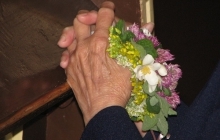The festival of Vijaydashami (Dussehra) is celebrated everywhere in the country.Everywhere the idols of Ravana are burnt. Ravana is symbolic of the ego. Ego does not have just one face, it has 10 faces (here representing the aspects or causes of ego). One who is egoistic thinks himself to be superior to others. When a person thinks too highly of himself, he stops caring about others. Such a person becomes insensitive and rigid. When a person loses his sensitivity, then the entire society has to suffer its ill-effects.
One may become egoistic because of position or status, wealth, or talent. If nothing else, it may arise because of negativity and ill will. One who becomes full of negativity also behaves like an arrogant person. He loses awareness. So this creates different kinds of mental imbalance due to which a person becomes miserable and also spreads misery and trouble to all around him.
Lord Rama is the symbol of Atma jnana (Self-knowledge); He represents the Soul. Lord Rama represents both – the Self and Self-knowledge. When Self-knowledge (Lord Rama) dawns within a person, then the Ravana within (meaning ego and all negativity) gets destroyed completely.
Ravana can only be destroyed and overcome by the Ram-baan (an arrow named after Lord Rama, meaning an arrow that never misses its mark). It means that only by Self-knowledge can one gain victory over all kinds of negativity and distortions of the mind.
How can one gain access to Self-knowledge? One can kindle Self-knowledge by Vishrama – that is by going into deep rest, and quieting the mind. It is said, “Vishrama mein Ram” (Lord Rama can be experienced only in deep rest when one reposes in the Self). All the distortions and disturbances we see in society today are because of a lack of Self-knowledge and spirituality. Today one does not give deep thought on questions such as 'Who am I?', 'What is my true purpose in life?', and 'What do I really need in life?'
The moment these questions arise in a person’s mind, that very moment all misery and negative tendencies disappear in life.
During the first nine days of Navratri, we celebrate, honour and worship the Mother Divine in all her forms and glories. The tenth day is celebrated as Vijaydashami – meaning the day of victory. Vijaydashami means the day when all the distortions of the mind and negative tendencies fall away. This day symbolizes victory over all cravings and aversions of the mind that we had gathered through the year. On this day, we symbolically let the fire of knowledge burn away all the negativity, and we offer it all to the sacred fire in the form of Aahuti (literally meaning a sacred offering to the holy fire). By doing so, all distortions disappear and we start to blossom from deep within. Intense joy gets kindled within us, and this benefits not only us but the entire society as well.






